The University Record, October 21, 1996
Regents react to PSAC members’ comments
Following the close of the presentations by the PSAC, members of the Board of Regents sat for a few moments in stunned silence. While they had known all along that they carry the great burden of selecting the University’s next president, it ap peared the the enormity of the responsibility had finally hit home. We share with you on this page their comments on the work of the PSAC and the challenges facing them in the next few weeks.
Deane Baker:
… I’ve participated in two other presidential searches, and I was reminded of the honor and the joy in the process which you have all experienced, and it is a great and wonderful process. I’d like to state one particular conversation and p araphrase it with Father Hessburg some years ago. He talked about the University of Michigan, and he said it is a great and wonderful institution, and it’s an institution that’s great because it’s free. Because it doesn’t have the burden of political in terference and other interference. And he talked about the autonomy of the instituion. He talked about the importance of maintaining the autonomy of the institution. I think that all of the Regents feel that same thing that Dr. Hessburg conveyed to me. But I want to just put in perspective what the Regents are trying to do in their protection of the individuals and protection of the search process. The state came into being in 1837, the University in 1817. In 1850, the fledgling university was being ruined by the politicians of the day. They called a constitutional convention to protect the University. And they set up the present system of electing Regents and made it a constitutional corporation. The constitution says, the Regents shall have car e of the money and the distribution thereof. And it also says quite plainly, the Regents shall elect the president of the University of Michigan. And that’s been reiterated in three subsequent constitutional conventions. The point I’m trying to make is what the Regents are doing in this process, it’s not that we want to disobey the law; it’s not that we don’t appreciate the court, and we don’t appreciate what the newspapers are doing. But the important thing for this institution is to remain free. An d that issue has never been tested in a constitutional way in our supreme court in the state of Michigan. And one day it will be, and this issue will be put aside and, I think, in favor of the University. But I do want to thank you for a tremendous am ount of work.
Nellie M. Varner: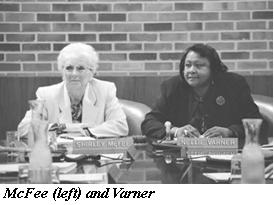 Dean Lehman, and all of the members of the commitee, I am personally just immensely and profoundly impressed by the report you’ve given us; deeply appreciative of the service you’ve given, and so m uch obvious passion and commitment and dedication on behalf of this institution; for the enormous focus and discipline that you had to endure the last seven months; and for the charge that you undertook with such seriousness and the work that you’ve prese nted to us today, the result. I want to thank you very much. …
Dean Lehman, and all of the members of the commitee, I am personally just immensely and profoundly impressed by the report you’ve given us; deeply appreciative of the service you’ve given, and so m uch obvious passion and commitment and dedication on behalf of this institution; for the enormous focus and discipline that you had to endure the last seven months; and for the charge that you undertook with such seriousness and the work that you’ve prese nted to us today, the result. I want to thank you very much. …
Shirley M. McFee:
I would like to make some concluding remarks. I want to thank the committee as well as Regent Varner has done. I also want to thank Provost Machen for his insight and excellent recommendations he made to us for members of this committee . And I also want to thank all of you for the flexibility that you have used in your schedules and particularly for the flexibility as events have changed our own expected schedules this week and your willingness to adapt your time frame and your procedu res to those demands. And I want to conclude by saying that now as you entrust this fruit of your labors to us, let me tell you how we plan to proceed. We will spend the rest of today and tomorrow reviewing the materials that you have provided for us, an d sometime tomorrow afternoon we will meet in public session to determine the people whom we wish to invite to this campus for interviews, public interviews, for four days. We will be looking at the materials of your four nominees in great depth; we will also be looking at the materials of others on the list that you have provided for us. And we want you to understand that while we are well mindful of your own personal urgings that we choose from among those four, we also want you to understand that any additions that we might make to that list should not be perceived as a lack of confidence and respect and, yes, trust in your work, but really a fulfillment of our own responsibility, which is that ultimate responsibility that on the eight people sitting at this table lies the responsibility for making this final selection. We thank you. We are going to as I said spend, not the number of hours that you have had, but we have the benefit of all of your preliminary work, so we will be spending a great man y hours in diligent research and tomorrow afternoon we’ll meet publicly to make some additional comments.
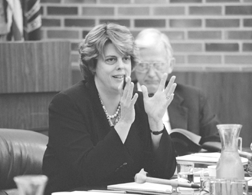 Rebecca McGowan:
Rebecca McGowan:
Dean Lehman, all members of the committee, I join with my colleagues in my admiration for what you’ve done, and I’m frankly very touched this morning by your description of your commitment to the University of Michigan. There are eight of us this morning who understand that these four people have now become public figures. They’ve become public figures in higher education in a way that they were not yesterday. They’ve become public figures in the state of Michigan, and likely in their own home states. That is a role that in prior presidential searches has probably been limited to the finalist or the person who actually becomes the president of the University of Michigan. In this instance, we have four people who find themselves in this unique position. That status will also be invested in any other individual whose name is mentioned at this table over the next two days. It is something one cannot understand until one has crossed that border, and I want to express on my own behalf as a member of this board my commitment, and I would hope my colleagues would join me, in respecting the enormity of what these people have decided to do. And I just would like to express my app reciation for their courage.
Andrea Fischer Newman:
I also want to thank you for all your work. I also want to comment on something that I see here this morning, that I see here regularly, that I see with everyone involved with this institution, and that’s the emotion that people have for the institution. When I came on this board I has no idea how I was going to react to things. I came off another university board that I was evidently less vested in. And I realize I get more passionate here about issues and things in regards to this institution than I do almost anywhere else in my life, barring my children. And I want you to know that we all understand how you feel about the work you’ve done, and that we appreciate your emotion and we appreciate your involvement. That emotion proves and shows your dedication and devotion, and that I personally, and I think I speak for the rest of us, will do our best to de serve your appreciation at the end of this….
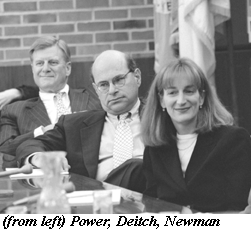 Laurence B. Deitch:
Laurence B. Deitch:
At the outset, like Dr. Akil, I want to confess to a personal bias. I’m very grateful to all of you for your work, but as somebody who is a lawyer and for 25 years has been accused of having 37 hours in my day, I was particularly gratified to find out that the lawyer worked three times the hours as the others. I also confess that this has been an emotional experience this morning. Listening to all of you, and weaving together into a mosaic the sum of all of your comments, I am humbled with the responsibility that we have. And my commitment to all of you and respect of the dedication and work, is to treat the great gift of your work with the utmost respect and dignity. And we will t ake the baton that is passed to us from you with gratitude and we will fulfill the duty that the constitution of the state of Michigan has invested in us and only in us. My view of a responsibility like this is that it’s frustrating over time when you’re criticized publicly, when your motives are challenged, when you do not appear to be trusted. It hurts. But on balance, we step forward because of our love of this insitution and our commitment to the values for which it stands. And in the scope of the history of this institution, which has an unlimited future, well beyond us, we’re stewards. We’re here for this brief momnent, and history has placed on us this responsibility and I am confident that we will step up to the challenge. I do believe that at the end of the process, the most important thing is trust. We will select a president who will lead this institution with grace and dignity and we will conduct ourselves in the same thoughtful manner. And I am confident that at the end that the stake holders of this institution, who are enormous in number and worldwide, will trust and have confidence that all who has a hand in this process did it right. And we thank you again.
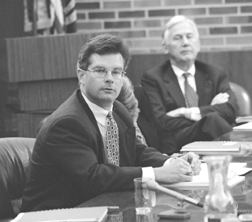 Daniel D. Horning:
Daniel D. Horning:
I would also like to thank all of you for your enormous commitment these past several months. The work that you’ve done is exemplary. I too am humbled by the process, and am humbled by what lies in front of us over probably these next 48 hours and on into next week. I also want to reflect on Regent Newman’s comments about the pa ssion that you’ve shown, the passion that we have and really the passion that everyone in this room and in this institution has. We’ve seen it today, we saw it the other day in the courtroom, the vested interest at all different levels. That it boils do wn to the word passion. Again I thank you; as we move forward the work that you have provided us will lead us to a great president.
Philip H. Power:
Frankly, I came into this room this morning, not expecting how it is that this meeting has transpired. I’m overwhelmed, not only at the quality of the committee and its work, and of the wisdom of Provost Machen in the kinds of selections that he made, but at the process through which this meeting took place and was organized so as to provi de a mechanism for the Regents to follow in our own deliberations which we hope is as careful, as thorough, as imaginative, and as respectful as you have conducted yourselves over the last months and this morning. We hope that we can come up to the very great standard that you have set. It is emotional. And the reason it’s emotional is because it’s important. Because the creation of seriously excellent public universities may be—with all the obligations of access and excellence, the creation of thes e institutions may be the signature creation of American society in the 20th century. And so we are honored by what you’ve done. Thank you.
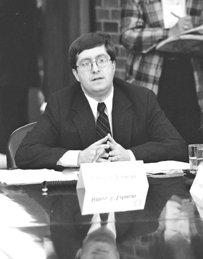 Jeffrey Lehman’s closing comments to the Regents:
Jeffrey Lehman’s closing comments to the Regents:
I did want to say I appreciate the comments that you made, and I want to reemphasize that the four names that we have recommended to you today are people who fully understand the process as it has been amended this week, they are eager and ready to go forward into that process, should you decide that you would like them to be finalists. They understand all of the different costs and benefits that are associated with different processes. And they have each made a personal choice that they would like to come to Michigan if you want them and to have a chance to interview with you in a publ ic session, to participate in a public town meeting.

